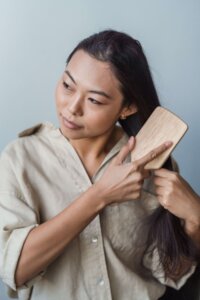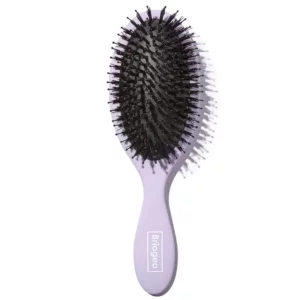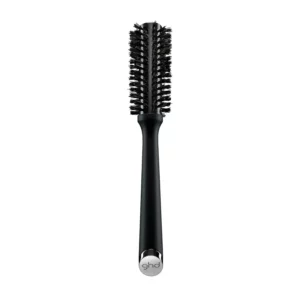Which Is Right for You?

When it comes to achieving healthy and lustrous hair, choosing the right brush is essential. The battle between synthetic and natural bristle brushes has long been debated in the haircare community. Each type of bristle offers unique benefits and considerations, making it crucial to understand the differences to determine which option is best for you. In this blog post, we will explore the battle of hair brushes, comparing synthetic and natural bristles to help you make an informed decision and achieve your desired hair goals.
Synthetic Bristles
Synthetic bristle brushes are typically made from nylon or other man-made materials. They are known for their durability, flexibility, and affordability. Synthetic brushes work well for detangling and styling, especially for those with thick or coarse hair. The bristles are designed to glide through the hair easily, minimizing breakage and reducing static. Synthetic brushes are also ideal for use with wet hair or when applying styling products, as they are less likely to absorb excess water or product residue.

Natural Bristles
Natural bristle brushes are made from animal hair, usually from boars or other animals. These brushes have been cherished for generations due to their ability to distribute natural oils from the scalp to the hair strands, providing nourishment and promoting shine. The bristles of natural brushes are typically softer and more delicate than their synthetic counterparts, making them well-suited for fine or delicate hair. Natural bristle brushes are excellent for smoothing and adding shine to the hair while reducing frizz.
ghd Natural Bristle Round Brush

Styling and Hair Types
When it comes to styling, both synthetic and natural bristle brushes have their advantages. Synthetic brushes are great for creating volume and adding texture to the hair. Their flexibility allows for easy maneuvering and styling, making them suitable for achieving a wide range of hairstyles. Natural bristle brushes, on the other hand, are particularly beneficial for distributing the hair’s natural oils evenly. This makes them ideal for individuals with dry or coarse hair, as they can help moisturize and tame unruly strands.
Maintenance and Longevity
Maintenance and longevity are important factors to consider when choosing a hair brush. Synthetic bristle brushes are typically easier to clean and are more resistant to heat and chemicals. They are also less prone to damage and tend to have a longer lifespan. Natural bristle brushes require more careful maintenance, as they can be more delicate and sensitive to heat or chemicals. Regular cleaning and gentle handling are necessary to preserve the integrity and longevity of natural bristle brushes.
Personal Preference and Considerations
The choice between synthetic and natural bristle brushes ultimately depends on personal preference and specific hair needs. Consider factors such as your hair type, texture, and desired styling results. Some individuals may find that a combination of both types of brushes works best for them, using synthetic brushes for detangling and styling, and natural bristle brushes for adding shine and improving overall hair health.
Conclusion:
The battle between synthetic and natural bristle brushes offers a range of options for achieving healthy and beautiful hair. Synthetic brushes excel in their durability, flexibility, and affordability, making them suitable for various hair types and styling needs. Natural bristle brushes, on the other hand, offer the benefit of distributing natural oils, enhancing shine, and taming frizz. Ultimately, the choice should be based on your hair type, desired results, and personal preferences. By selecting the right brush, you can elevate your haircare routine and achieve the stunning locks you’ve always desired.

